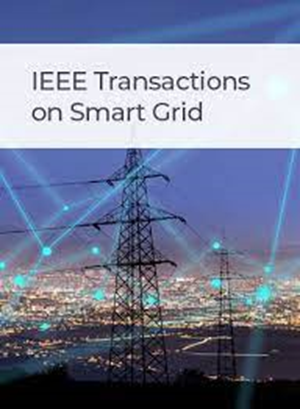基于电网感知的电动汽车充电站调度与控制:理论与实验验证
IF 8.6
1区 工程技术
Q1 ENGINEERING, ELECTRICAL & ELECTRONIC
引用次数: 0
摘要
本文章由计算机程序翻译,如有差异,请以英文原文为准。
Grid-Aware Scheduling and Control of Electric Vehicle Charging Stations for Dispatching Active Distribution Networks: Theory and Experimental Validation
This paper proposes and experimentally validates a grid-aware scheduling and control framework for Electric Vehicle Charging Stations (EVCSs) for dispatching the operation of active distribution networks (ADNs). The framework consists of two stages. In the first stage (day-ahead), we determine an optimal 24-hour power schedule at the grid connection point (GCP), referred to as the dispatch plan. Then, in the second stage, a real-time model predictive control (RT-MPC) is proposed to track the day-ahead dispatch plan using flexibility from EVCSs and other controllable resources (e.g., batteries). The dispatch plan accounts for the uncertainties of vehicles connected to the EVCS along with other uncontrollable power injections, by day-ahead predicted scenarios. The RT-MPC accounts for the uncertainty of the power injections of stochastic resources (such as demand and generation from photovoltaic – PV plants) by short-term forecasts. The framework ensures that the grid is operated within its nodal voltage and branches power-flow operational bounds, modeled by a linearized optimal power-flow model, maintaining the tractability of the problem formulation. The scheme is numerically and experimentally validated on a real-life ADN at the EPFL hosting two controllable EVCSs (172 kWp and 32 kWp), multiple PV plants (aggregated generation of 42 kWp), uncontrollable demand from office buildings (20 kWp), and two controllable BESSs (150kW/300kWh and 25kW/25kWh).
求助全文
通过发布文献求助,成功后即可免费获取论文全文。
去求助
来源期刊

IEEE Transactions on Smart Grid
ENGINEERING, ELECTRICAL & ELECTRONIC-
CiteScore
22.10
自引率
9.40%
发文量
526
审稿时长
6 months
期刊介绍:
The IEEE Transactions on Smart Grid is a multidisciplinary journal that focuses on research and development in the field of smart grid technology. It covers various aspects of the smart grid, including energy networks, prosumers (consumers who also produce energy), electric transportation, distributed energy resources, and communications. The journal also addresses the integration of microgrids and active distribution networks with transmission systems. It publishes original research on smart grid theories and principles, including technologies and systems for demand response, Advance Metering Infrastructure, cyber-physical systems, multi-energy systems, transactive energy, data analytics, and electric vehicle integration. Additionally, the journal considers surveys of existing work on the smart grid that propose new perspectives on the history and future of intelligent and active grids.
 求助内容:
求助内容: 应助结果提醒方式:
应助结果提醒方式:


